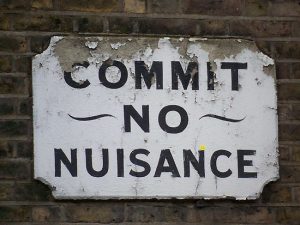How do nuisance laws work?
Contemporary nuisance ordinances fine property owners for “excess” 911 calls to their properties. Typically passed at the local level, they target things like drug dealing, prostitution, excessive noise, and building code violations. In some ordinances domestic violence is specifically excluded, in some it is included, and in many it is not mentioned at all, leaving its enforcement against victims of IPV up to the discretion of police.
Nuisance ordinances require that property owners “abate (stop) the nuisance” or face fines, property seizure, or even jail. To prevent these sanctions, landlords often evict their tenants.
Nuisance laws are especially troubling for victims of intimate partner violence. They apply even if the resident was a victim of a crime or had no way of controlling the nuisance conduct. They focus on the repeat 911 calls as the problem to be solved rather than the conduct that precipitated the calls. This turns the victim into an offender for calling 911 and obscures the real crime of intimate partner violence.
How common are nuisance laws?
 No one knows, since there is no centralized data base for nuisance laws. Although these laws have been around since at least the mid-1800s, contemporary versions triggered by 911 calls have increasingly been adopted by cities throughout the United States, and estimates are that there are thousands of them. One non-exhaustive search found over 100 nuisance laws in the state of Illinois alone (Shriver Center 2013).
No one knows, since there is no centralized data base for nuisance laws. Although these laws have been around since at least the mid-1800s, contemporary versions triggered by 911 calls have increasingly been adopted by cities throughout the United States, and estimates are that there are thousands of them. One non-exhaustive search found over 100 nuisance laws in the state of Illinois alone (Shriver Center 2013).
Why do cities adopt nuisance laws?
People give several different reasons. Some cities incorporate them into “quality of life” initiatives to keep middle class residents in the city by enabling police to respond to neighborhood problems quickly. Some proponents see them as a way to cut down on the number of 911 calls, recoup the costs of providing emergency services, and force landlords to control their tenants’ behavior. And some researchers think they are a way to exclude certain race and class groups from communities (Arnold 2019; Mead et al., 2017).
Why are nuisance laws a bad thing?
Nuisance laws make people afraid to call 911 in emergencies because enforcement is triggered by repeat 911 calls to an address. This is especially dangerous for victims of intimate partner violence, who need the police for protection. But they also have a more widespread chilling effect, making residents of entire neighborhoods afraid to report crimes or even call for an ambulance. So rather than enhancing public safety and reducing crime, they have the opposite effect.